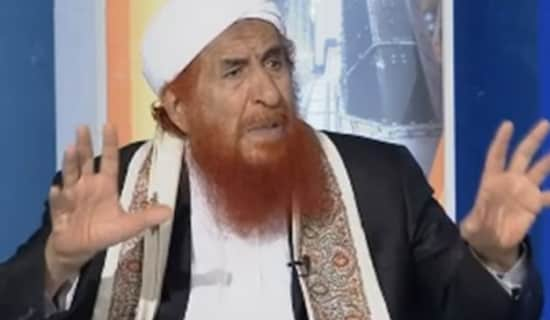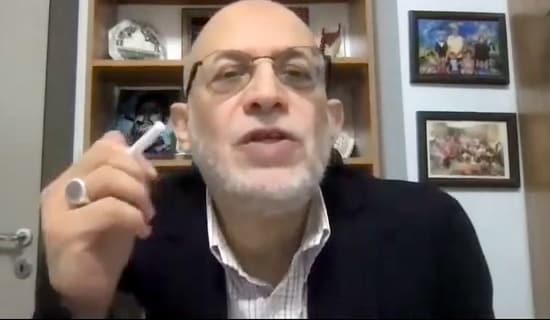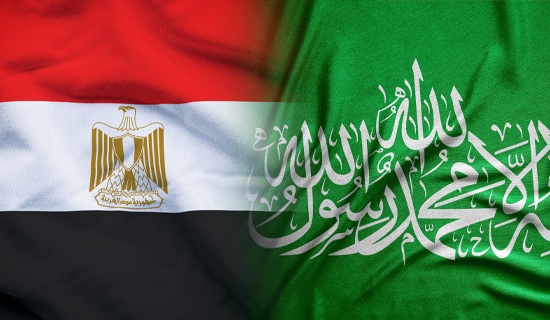The Russian-led dispatch of peacekeeping forces from the CSTO (Collective Security Treaty Organization to Kazakhstan was defended by Russian officials and their media surrogates as a response to outside intervention and particularly in the form of a "color revolution". Color revolutions are the bete noire for the Russian leadership as they had swept pro-Russian leaders from power in the "Orange Revolution" in Ukraine and the "Rose Revolution" in Georgia. Vladimir Putin in a videoconference on January 10, 2021 with CSTO members said the following:
"We know that the current threat to Kazakhstan’s statehood is not rooted in the spontaneous protests over fuel prices but in the fact that destructive internal and external forces made use of this situation. The people who protested over the situation on the fuel market and their goals are different from the people who took up arms to attack the state and their goals.
Actively used were ‘Maidan’ [Ukraine] technologies of armed and information support for the protests. There were organized and controlled groups of fighters, as President Tokayev has pointed out just now, including people who had apparently received training in terrorist camps abroad, and their attack on Kazakhstan, as President Tokayev has noted – and it was essentially an attack on the country, on Kazakhstan – amounts to an act of aggression. I fully agree with him in this regard.
We have been witnessing an international terrorist aggression. Where did these armed groups come from? It is obvious that they were trained in foreign camps and acquired combat experience in hotspots around the world...
Of course, we understand that the events in Kazakhstan are not the first and certainly not the last attempt to interfere in the domestic affairs of our states from outside. I agree with the President of Belarus on this. The measures taken by the CSTO clearly show that we will not allow anyone to stir up trouble at home and will not permit the realization of another so-called color revolution scenario.[1]
Military expert Vladislav Shurygin told Izvestiya that the intervention had come in a timely manner because international terrorist groups know how to exploit protest attitudes using sleeper cells and extremist religious propaganda among the youth and poorer segments of the population. Their efforts were snipped in the bud and prevented Kazakhstan from becoming another Iraq or Syria.[2]
However, the official message was frequently blurred because the protesters against the regime of Kazakh President Kassym-Jomart Tokayev were alternately Western sponsored color-revolutionists or Islamic Jihadists.
The Russian Middle East expert and political analyst, Yevgeny Satanovsky commented on the mass protests, riots, and capture of administrative buildings that that took place before the military intervention that he advocated provided the request came for Kazakhstan's leaders.
"The situation in Kazakhstan is intense. This is, to put it mildly, judging by unfolding events, a most genuine color revolution." But as to the protagonists of this revolution, Satanovsky was unclear: "Everybody will try to dethrone the authorities: liberals and Islamists, pan-Turkists and regional elites."
"Finally, there are serious figures from the ranks of ex-ministers and other high-ranking officials, who have been forced out of the government and are living abroad with a lot of money and connections."[3] Moscow's ambassador to Washington Anatoly Antonov tried to straddle the issue by claiming that the thousands of jihadists and looter who had tried to undermine the constitutional order had been unleashed by Washington's precipitous withdrawal from Afghanistan that permitted the rapid spread of extremist ideas.[4]
Another problem for the official narrative was the emergence of a counter-narrative – the fighting was an internecine battle between the country's elites resulting from Tokayev's decision to liquidate the power of his predecessor Nursultan Nazarbayev including the role of Security Council Chairman. Political analyst Arkady Dubnov in an interview with Novaya Gazeta gave his take on the situation that led to the intervention. The severe rioting occurred "when Tokayev had already dismissed Elbasy [the father of the nation] (ex-President of Kazakhstan, Nursultan Nazarbayev) from the position of the Chairman of the Security Council. In other words, he demolished the first center of power.
In turn, the people, who acted 'in retaliation' in the interests of Nazarbayev, apparently, were ready to demolish the second center of power, and thus, to conduct a counter-coup. As a result, a third center of power could've emerged.... The thing is that people, who could've taken power in Kazakhstan, probably, wouldn't be very loyal to Russia, to put it mildly."
Dubnov was asked by the interviewer: - There is much talk that now when there is a precedent for introducing peacekeepers during internal crises (despite the fact that it was justified by "external aggression") other presidents of the CSTO member-states will be happy to use this option, if anything happens. Will this be the case?
Dubnov replied: No one enjoys the situation and no one will. As for the rest, we are witnessing a simple political ploy. 'Threats to stability' in post-Soviet states oriented towards Russia will be considered external and characterized as such, regardless of their origin. This will mean the activation of the basic CSTO mechanism, which provides for assistance in case of external aggression.[5]
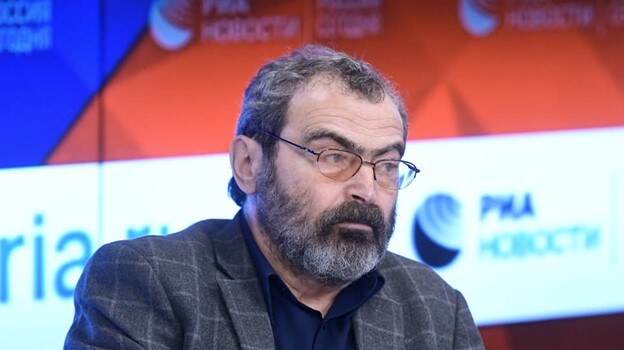
Arkady Dubnov (Source: Kommersant.ru)
Yuliya Latinina, a senior correspondent for the liberal Echo of Moscow radio station compared the logic of the CSTO to that of NATO: It is NATO that exists to defend itself against external aggression. Can you imagine that Macron would ask NATO to bring in armored vehicles to suppress the yellow vests?... In the near future, Zimbabwe, Sudan, Venezuela, Syria and various other fragments of the Mesozoic era may join them. So normal countries will join NATO to protect themselves from Russia, and rogue countries will join the CSTO to protect them from the people, because no one else provides this service on the market."
She cautioned Putin against a long-term intervention in a country that is hopelessly corrupt: So as Brezhnev invaded Afghanistan, Putin invaded Kazakhstan in response to a request and to provide international assistance. I hope that this is indeed a short-term intervention, and there is indeed every chance that Putin will quickly leave, because, as I said, this is a charitable service rendered to the cannibal. Well, we love to provide them with disinterested service. And if Putin tries to get something for his brotherly help, then, of course, the Islamization of Kazakhstan will begin. 10 years down the road there will be subsequent massacre of the Russians [living in Kazakhstan] and many unpleasant things."[6]
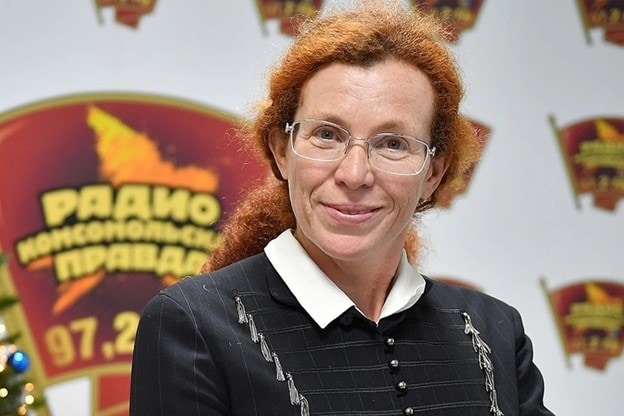
Yuliya Latinina (Source: Radiokp.ru)
SUPPORT OUR WORK

Kommersant commentator Dmitry Drize picked up on the problematic nature of the official line: "But who are these terrorist fighters? Where did they come from? And who is the main mastermind? No answer has been given to these questions. There was some sort of hint to the Middle East and international [terrorist] cells, but clear answers will be provided by the investigation... The president [Putin] recalled the 'Maidan technologies' and corresponding information support. But, the Russian president didn't elaborate from where and who led the coup or the invasion."[7]
The counter-narrative of a fight between Tokayev and Nazarbayev also extended to talk about the succession to Vladimir Putin. A popular theory was that Putin would appoint some nonentity to be titular leader but he would run things behind the scenes. The model for this was Kazakhstan were Nazarbayev had relinquished the leadership ostensibly to Tokayev but continued to head the ruling party and the Security Council. Professor Valery Solovey quipped: "The plans of [Putin's] succession will probably have to be abandoned now. One must die in the Kremlin." The highly popular blogger "El-Murid" commented: It is already clear that the Kazakh option is unacceptable. Nazarbayev nominated an extremely weak successor (and Tokayev’s weakness is now beyond doubt, against the background of the crisis), furnishing him with his creatures and sitting next to him, maintaining control over personnel issues... It seems that the scheme is logical and working, but as it turned out, it is empirically unstable. In Asian despotism, the balance system either does not work or works poorly. The despot either has full power, or there is a temptation to push him away from it. That is exactly what happened in Kazakhstan."[8]
A day before, the El-Murid blog scoffed at the official narrative: "They write that robberies and looting, as well as murders (including those of the military) coincided with the massive and undocumented release of criminals from camps and prisons. In fact, it was they who became the factor that launched the violence in Alma-Ata (despite the fact that in the rest of the country the protests are, albeit harsh, but completely peaceful). It is clear that someone from the ruling nobility can release the prisoners, and not the State Department or ISIS emissaries."[9]
Timofei Bordachev, the program director of the Valdai Discussion Club think tank established by the Kremlin, tried to defend the CSTO as an altruistic measure by Russia that would resemble Russia's current role in Syria rather than Russia's ( and the US') disaster in Afghanistan. Interestingly enough, Bordachev realizing perhaps the flimsiness of the official version tries to skirt the issue: "In Kazakhstan, what happened happened. Understanding the origins or basic driving forces behind the conflict is of purely analytical value now, and will likely prove to be of great interest to historians in the future." Bordachev's article titled "What Is Russia Doing in Kazakhstan?" follows below:

Contingent of CSTO peacekeepers in Kazakhstan (Source: Odkb-csto.org)
"The dramatic events in Kazakhstan are a stark reminder to us all of how fragile is the statehood of the countries that emerged 30 years ago along Russia's borders. At the same time, it's new evidence of the special role that Russia plays aiming at ensuring for the outskirts of the former [Russian] empire and the USSR that takes the form of sovereign powers.
"In today's circumstances, fulfilling this role requires a balance between putting one's own interests first and sincerity towards one's neighbors. A sober recognition that they [the former USSR states] will inevitably have to go through a rather difficult path, but without irony or a derogatory attitude [on the part of Russia]. Therefore, for a better understanding of the situation and its long-term significance, it is necessary to clarify a few theses.
"First, the circumstances are such that even catastrophic developments in neighboring states don't pose a challenge bearing an existential threat to Russia. If such was the case, then the year 1991 [i.e. the year of the USSR's collapse] would not have happened. Back then Moscow itself, for its own benefit, let all the republics of the former Soviet Union to withdraw from it.
"We must never forget that Russia's unique geopolitical location, as well as its endowment of natural and human resources, doesn't require control over its neighbors. Transport and logistics-wise Russia is also fully independent from them. For instance, even the Trans–Siberian Railway's main line has long been running north of Kazakhstan's borders.
"Moscow can respond to the challenges that the collapse of its neighbors' statehood might pose, from its own territory. In the case of Kazakhstan, situated between Russia and its most important ally, China, the possibility of the country turning into a territory, at which the forces of adversaries comparable in power to Russia will be deployed, is miniscule.
"Therefore, in any case in Russian actions the moral imperative is dominant rather than any immediate security considerations. In any case, the [Kremlin's] goal is the preservation of a united and independent Kazakh state. Especially since the latter, unlike Ukraine, was not created as an anti-Russian project with its potential for exploitation by interests hostile to Moscow.
"Second, the reasons for events unfolding in Kazakhstan have nothing to do with Russia or our common past [i.e. Kazakh and Russian peoples past]. It's a product of independent development, evidencing to the fact that the necessary reforms haven't always kept pace with the challenges of the times. Let's hope that such shortcomings won't be fatal.
"To draw parallels with other states of a similar geopolitical size, or to make categorical judgements about the Kazakh state on the basis of such comparisons now seems to be a rather superficial approach. Each country is unique in terms its internal structure and the key factor of political development. The science of international relations in general pays little attention to internal factors, as they are way too diverse. We should only be interested in the consequences of an ad hoc situation.
"Third, there is no ground to argue that Russia "slept through" the crisis situation in a neighboring country and that Russian expertise lacks sufficient knowledge. The latter factor doesn't matter in the least. We knew everything about Ukraine, but it didn't help to prevent the 2014 coup there. Furthermore, Kazakhstan joined the CSTO and is an EAEU member-state. So, it would be strange to demonstrate such a high level of distrust towards the allies, as to monitor them in the same way as the Americans do.
"Be that as it may, Russia didn't appropriate the right to interfere in the internal affairs of its neighbors and respects their sovereignty (even if this poses unexpected surprises). In any case, trust is more important.
"In Kazakhstan, what happened happened. Understanding the origins or basic driving forces behind the conflict is of purely analytical value now, and will likely prove to be of great interest to historians in the future. Much more important is how Russia's behavior in the circumstances that occurred was consistent with the country's own goals and its inescapable responsibility as Eurasia's strongest military power.
"The decision to deploy peacekeepers to Kazakhstan under the CSTO agreement, as it seems to me, was not only in character with its obligations as an ally, but also with the nature of Russia's involvement in its neighbors' affairs. All the more so because its implementation can set a precedent for constructive engagement in their fate [of CSTO member-states] when it's really needed.
"A few days ago, we witnessed a situation, when Kazakhstan's largest city and several other towns were in the hands of armed looters and extremists. The situation there was critical, and the authorities urgently needed a material manifestation of the fact that they weren't alone in facing their problem. [They needed] precisely a material manifestation, because we [Russia and Kazakhstan] hardly consider the experience of the EU, which always expresses "deep concern" but never does anything, to be successful.
"None of the former Soviet Union countries has been through anything like this yet, and now we are talking about Kazakhstan, which, alongside of Belarus) is tied to Russia, economically and socially. Therefore, Russia, as a strong country, should have provided assistance rather than ponder on how its actions would be interpreted. In fact, we [Russia], probably, shouldn't care at all who benefits from its presence [in another country] or whether accusations will echo against us. A nuclear power with a 500-year-long sovereign history can afford to rise above that.
"Now the Kazakh authorities are gradually taking control over the situation. Judging by the reports, it won't be easy and will take some time. Due to its geopolitical location, over 30 years, the Kazakh had no need to seriously prepare to face external threats. Thus, we are witnessing some of the consequences of this situation. But Kazakh statehood didn't collapse, and the presence of CSTO troops provides a feeling of confidence to the local power structures, administration and population.
"However, the ultimate pacification and Kazakhstan's return to stable development cannot be Russia's concern, or be implemented under Russia's leadership. This step would be meaningless, if not counterproductive in the long-term perspective. We have the example of the USSR and the US that several times tried to engage in "state-building." It didn't lead to anything good.
"However, there is also an opposite example, Syria, in which Russian assistance didn't attempt to introduce external rule to the country; official Damascus is rebuilding the state itself.
"Moreover, the situation in Kazakhstan has not yet went that far. Indeed, the CSTO member-states deployed their military contingents to Kazakhstan in order to avoid a Syrian scenario. If they wouldn't have done it now, then in several years, if not months, they would have to use other resources. Thus, the events in Kazakhstan aren't just a warning signal, but also an opportunity for Russia. Above all, it's a chance to act unconventionally, beyond the limits of what is expected of Russia, based on our own or the American experience.
"While Russia's actions are bringing new experiences in dealing with internal instability in friendly countries, we [Russia] sincerely wish for our neighboring countries to develop successfully.
"However, we cannot but understand that in the coming decades, Moscow will, very likely, have to reach more than once a balance between its own independence and its responsibility for the fates of the small states around it. Naturally, this is a much more difficult task than rebuilding an empire or, on the contrary, walling itself off from the neighbors. But it is precisely this task's complexity that makes it a worthy endeavor for a country like Russia."[10]
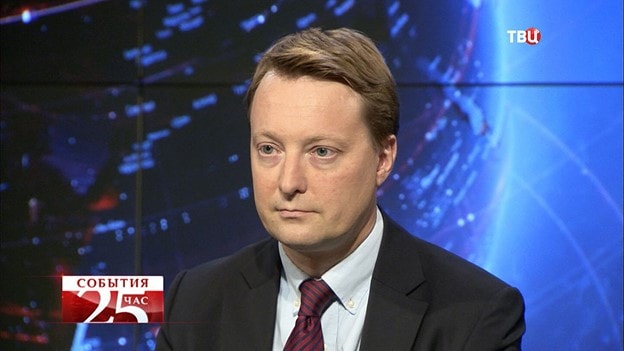
Timofei Bordachev (Source: Tvc.ru)
[1] Kremlin.ru, January 10, 2022.
[2] Iz.ru, January 10, 2022
[3] Mk.ru, January 5, 2022.
[4] Mk.ru, January 10, 2022.
[5] Novayagazeta.ru, January 8, 2022.
[6] Echo.msk.ru, January 8, 2022.
[7] Kommersant.ru, January 10, 2022.
[8] El-Murid.livejournal.com, January 8, 2022.
[9] El-Murid.livejournal.com, January 7, 2022.
[10] Vz.ru, January 8, 2022.


